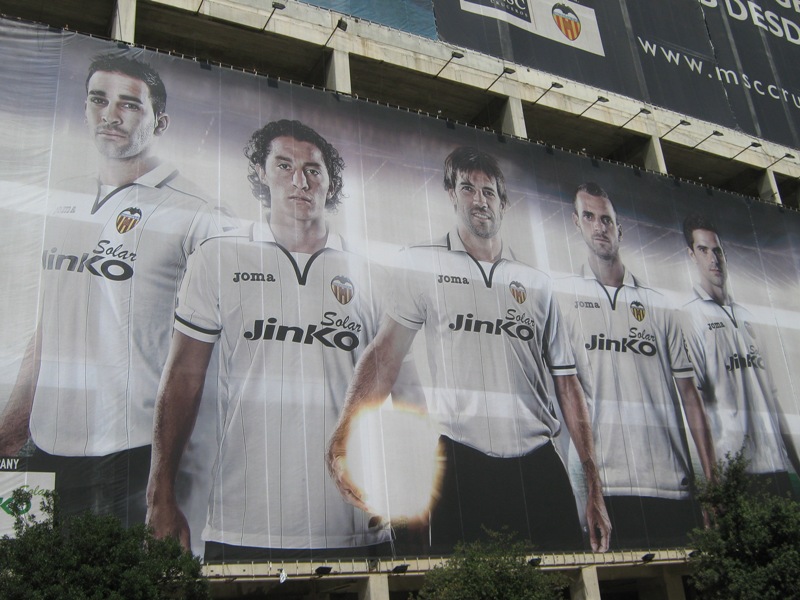Valencia FC was founded (where all important organisations should be founded) in a bar, Bar Torino, in the centre of Valencia in 1919.
The first president, Octavio Augusto Milego Díaz, was chosen without a fiercely contested election campaign, by tossing a coin.
The first club HQ was a small place in Calle Barcelonina, and the club was totally ignored by the Valencian press, which didn’t deal with sport in its pages in those days. Today of course, Spain’s biggest selling newspaper in a Sports newspaper, Marca.
Although Valencia has apparently never had a British player in its ranks, it was inevitably through contact with Britain, and specifically through the export of fruit and vegetables, that the sport began to be popular in Valencia.
The guilty men were Francisco Sinisterra and Ramón Leonarte; two Valencians who frequently visited Britain in that epoch for business purposes. Furthermore, it was a common sight in those days to see British sailors kicking a ball around in the port, and Valencians certainly know a good thing when they see it.
In fact, Valencia’s other current first division club, Levante, was founded in the port area and has always been closely linked to that area even though the stadium has now moved inland.
Valencia’s first official match took place in Castellón on 21st May 1919 against a team called Gimnástico, a match which Valencia lost 1-0. The first ever line-up was Marco, Peris, Julio Gascó, Marzal, Llobet, Ferré, Fernández, Umbert, Martínez Ibarra, Aliaga and Gómez Juaneda.
Valencia’s first stadium was Algirós, where they played from 7th December 1919 until 1923, when they moved to their present stadium (for the moment) Mestalla.
The first game in Mestalla was against Castalia, a team from Castellón and the result was a 0-0 draw. The following day (men were men in those days!) they replayed the game and Valencia won 1-0.
The next team to visit Mestalla was Scottish club Dundee United. Once again there were two games played on two consecutive days and Dundee won both times; 0-3 and 0-1.
Coinciding with their move to Mestalla in 1923, Valencia won the regional championship, which allowed them to participate for the first time in the Spanish Cup. Their first cup match was curious; Valencia beat Sporting de Gijón 1-0 in the home game, but were plastered 6-1 in the away game. However, as goal average didn’t count in that epoch, the two teams had to play a third game, in Oviedo, where Sporting won 2-0.
At about the same time Valencia had its first international player, Eduardo Cubells.
The sixties were glorious years for Valencia, although they began tragically when their Brazilian star, Walter was killed in a traffic accident on 2nd July 1961 in El Saler.
With Julio de Miguel Martínez de Bufanda as president Valencia began to look beyond its frontiers towards European competitions and foreign star players. The club was invited to join what would later become the UEFA Cup, which at the time was curiously by invitation for teams whose city had International Fairs, rather than qualification. Valencia signed another Brazilian star, Waldo.
Valencia’s first UEFA rival was none other than Nottingham Forest, who they beat 2-0 at home and 1-5 away. The game was marked by a close escape when the team’s plane almost joined Manchester United in the annals of sports tragedy by narrowly avoiding an accident over the Pyrenees.
In the same competition Valencia eliminated Lausanne and Inter de Milan before destroying MTK Budapest 3-0 and 3-7 in the semi-final.
The final, against eternal rivals Barcelona, could not be played that season due to the 1962 World Cup and was played the following year.
Valencia eventually won the cup by beating Barcelona 6-2 and then drawing 1-1 in the second leg.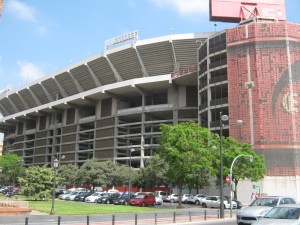
The following year (although it was in fact the same season) Valencia repeated their success. In the first round their rivals included Scottish teams Celtic (4-2, 2-2) and Dunfermline (4-0, 6-2), which meant that a tie-breaker was played in Lisbon and Valencia won that 1-0. They then faced Hibs, who Valencia beat 5-0 at home and lost to 2-1 away.
After beating AC Rome 3-0 and 0-1, Valencia met Dynamo Zagreb in the final. They won both games, 1-2 away and 2-0 at home in front of 55,000 supporters.
The following year Valencia also had to speak a little English, this time against Irish team Shamrock Rovers. Valencia won 0-1 away in the first leg but almost lost the home match, finally drawing 2-2 after being 0-2 down.
Valencia then eliminated Rapid Vienna and Ujpest Dosza of Budapest. In the second game a scandal arose when the Hungarian team were awarded a goal that had entered through a hole in the side of the net, but Valencia managed to get through, winning 5-2 at home and losing 3-1 away.
Valencia went on to beat German team FC Koln in the semi-final but their winning run was ended by Spanish team Zaragoza, in a tense match with a Valencian goal disallowed and a Valencian player sent off for arguing.
The next few years were leaner for Valencia until 1967 when they won the Spanish cup.
In the 65-66 season, Valencia eliminated Hibs again, despite being forced to a tie-breaker.
In the third round Valencia faced Leeds United, then in their hey-day. After a violent first game, in which two Valencian players were sent off at Elland Road, Valencia managed a 1-1 draw, but they lost the home game in an equally violent match in which Jackie Charlton was sent off. The winning goal, or so the Valencian team claimed, was scored à la Maradona, with the hand.
The following year it was once again Leeds who knocked Valencia out of the UEFA cup, despite a 1-1 draw at Elland Road. Leeds won the match in Mestalla 0-2.
The 1967-8 season saw Valencia’s debut in the Cup-Winners’ Cup, with easy victories against Crusaders of Belfast 4-0 and 2-4. They also beat Red Star Bucarest before falling to Bayern Munich.
In the 70s a new manager would arrive in Valencia, one whose name is still remembered, and who is currently the honorary president of Real Madrid; Alfredo de Stéfano.
The arrival of Argentinean coach and ex-player Alfredo de Stefano marked the beginning of one of Valencia’s best epochs, however brief. They were champions of the Spanish league (1970-71), and they also came close to ‘doing the double’, but lost the cup final to Barcelona 4-3 in extra time after drawing 2-2 at the end of 90 minutes.
In Europe they were defeated in the second round by Belgian team Beveren Waas after beating the Irish club Cork Hibernians in the first round.
The following season saw Valencia securing worthy second places in both the league and the cup, which were won by Real Madrid and Atletico de Madrid (2-1) respectively.
This was the season that saw Valencia’s first participation in the European Cup (as the Champions League was then called).
After beating Luxemburg and Hadjuk Split in the first two rounds, Valencia were defeated by Hungarians Ujpest Dosza 0-1 and 2-1.
The next season was a grey one for Valencia and one dogged by injuries. They could only finish 6th in the league and were knocked out in the second round of the Spanish cup by local rivals Castellón.
Their participation in the UEFA cup wasn’t much better, losing in the second round to Red Star Belgrade.
They did however knock out Manchester City in the 1st round, drawing 2-2 in Manchester and winning 2-1 at home.
The 1973-4 season saw the end of Alfredo Di Stefano’s reign in Valencia. The club only managed to come 10th in the league and were knocked out of the cup by an inferior UD Las Palmas.
They didn’t play in Europe this season, nor, logically the following year, when they hired Yugoslavian coach Milovan A. Ciric to replace Di Stefano.
The result wasn’t brilliant; the club finished 12th in the league and were knocked out of the second round of the cup.
1975-6 saw a new president and a new trainer. However, Milosevic, another Yugoslavian only lasted three weeks and was replaced by Manolo Mestre.
The team finished tenth and once again was knocked out in the second round of the cup.
The next year saw the arrival of one of the most enigmatic players (possibly the most enigmatic player) in the club’s history: Argentinean Mario Kempes.
Although Valencia only finished 7th, and lost another coach, Kempes was the league’s top scorer (“pichichi”) with 24 goals.
The following season (1977-8) saw the beginning of Valencia’s ‘dream team’. Despite losing the first game 3-0, the team finished fourth, qualifying for the UEFA cup again, and Kempes repeated as top scorer with 28 goals. They also made it to the semi-final of the cup, where they were beaten by Real Sociedad.
The next year Valencia won the cup for the 5th time after a thrilling final against Real Madrid, in which Madrid missed a penalty. The final result was 2-0.
In the league they could only manage 7th position, and in the UEFA cup were knocked out by Birmingham side West Bromwich Albion in the third round.
The final months of the 70s saw the return of Alfredo Di Stefano as coach and the beginning of European success for Valencia, who would win a final against an English side and knock out a Scottish team en route.
In 1980, with Alfredo Di Stefano as their coach and Mario Kempes as their star, Valencia won the European Cup Winners Cup.
After eliminating a Danish side in the first round, Valencia was paired with Glasgow Rangers. Despite a home draw, Valencia won the away game 1-3.
After dispatching French team Nantes in the semi final, they faced Arsenal in the final on March 14th in Brussels.
The game was goalless at the end and so was decided on penalties. Surprisingly Kempes failed the first penalty and things looked grim (unless you were an Arsenal fan of course). Nevertheless, Liam Brady, who later became one of the first British (or Irish) players to play on the Continent (Juventus), missed his penalty too.
The next eight penalties were successful (unless you were the goalkeeper of course). Then Valencia scored its next penalty but Rix failed for Arsenal and Valencia were champions.
The Valencian supporters went mad, but the Arsenal supporters went madder and many Valencians were hospitalised before the Arsenal supporters turned their attention to shop windows and other inanimate objects.
In the 1980-1 season, Di Stefano left and Valencia came fourth in the league. It was to be Kempes’ last year at Valencia too. The only real success was to win the European Super Cup by beating last year’s European Cup winners, Brian Clough’s Nottingham Forest.
On November 25th 1980 Forest won their home game 2-1 at the City Ground, which meant that with away goals counting as double, Valencia only had to win 1-0, which they did, despite the efforts of Peter Shilton to keep them out. Valencia became the first Spanish team to win the Super Cup.
1982 was a great year for Spanish football as Spain became host to its only World Cup to date. For Valencia the season was mediocre compared to others and the team only came 5th in the league and reached the quarter final of the UEFA Cup.
The 1982-3 season saw the return of Kempes, although he was not to be the player he had been.
In the pre-season Orange Trophy, Valencia was eliminated in the second game, although they beat Luton Town in the first.
The first league game saw an Argentinean duel between Kempes and Barcelona’s Maradona, which Valencia won 2-1, although they didn’t win any of the following eight games.
Valencia narrowly avoided relegation, coming 15th in a league of 18 teams.
In the UEFA Cup Valencia drew Manchester United in the first round, drawing 0-0 at Old Trafford on September 15th, 1982, and winning the home match 2-1, after being 0-1 down.
After passing the next two rounds, Valencia was finally defeated by Anderlecht in both ties.
The next two seasons were ones of sporting mediocrity and financial ruin and in 1985-6 the team was relegated to the second division, despite a last minute return of Di Stefano. The 1984-5 season saw the signing of defender Quique Sanchez Flores who, this season, is the club’s coach.
Valencia only stayed one season in the second division and in 1987 returned to its rightful place among the best teams of Spain, once again under the guidance of Di Stefano.
In the pre-season Orange Trophy, Valencia lost the final to Barcelona thanks to a single goal by Gary Lineker, and the rest of the season didn’t go much better, resulting once again in Di Stefano’s sacking.
The following year, Valencia gained third place in the league, which meant that they would be back in Europe the following season, although their elimination in 1990 in the UEFA Cup second round was unspectacular. Nevertheless, they did finish second in the league and reached the semi-final of the Cup.
The eighties had been a decade of ups and downs for Valencia; the nineties would see many great players wearing the Valencia shirt, including Romario, and many managers, but no significant successes, despite a few near misses, until the last year of the century, when success would finally return.
Valencia’s star of the early 90s was the Bulgarian player Penev, wearing the number 9 shirt that would for many years become a kind of jinx for Valencia until the recent arrival of Fernando Morientes from Liverpool.
In the 1990-1 season, Penev was largely out of action due to an illness and the club finished 7th in the league, being knocked out of both the Spanish and UEFA cups in the second round.
The 1991-2 season saw the beginning of the era of Dutch coach Gus Hiddink. The team finished 4th, qualifying for the UEFA cup and lost the quarter final of the cup to Real Madrid, having eliminated Barcelona in the previous round.
The following year saw the signing of Mendieta, who would be the team’s star and captain for many years. Valencia was 4th again in the league and made the semi final of the cup, where they lost to Zaragoza.
The UEFA cup was humiliating for Valencia, who lost the home game 1-5 to Napoli and lost 1-0 away. All 6 goals were scored by the Uruguayan player Fonseca, who Valencia had refused to sign years before. The Napoli manager was Claudio Ranieri, who would later serve twice as Valencia’s manager.
In the 1993-4 season another star joined Valencia, Pedja Mijatovic, the Yugoslavian player who became a club hero and later villain when he signed for Real Madrid.
The club had no less than 5 managers this year, starting and ending with Hiddink. They also suffered another humiliation in Europe, losing 7-0 to Karlsruher after winning the home game 3-1.
They came 7th in the league and were kicked out of the cup in the first round.
The end of the season saw the election of Paco Roig, whose style of running the club seriously divided both fans and officials for several years.
The Orange Trophy, in its 75th edition, was played against Chelsea, who won on penalties.
Roig was a man who liked to be in the headlines and liked to think big. He hired World Cup winning manager Carlos Alberto Pariera, and did see the team reach the final of the cup, which was suspended before the end due to rain, and then won by Deportivo de Coruña with a goal scored during the 11 minutes for which the game was replayed.
In the league however, the team could only finish 10th.
The following season, 1995-6 saw another change of manager with the arrival of Luis Aragonese, who later became coach of the Spanish national team that won the Euro 2008 Championship.
This year Valencia were runners up with the championship being decided on the last day of the season. In the cup they lost the quarter final to Atletico de Madrid, who achieved the double.
Despite the promise of the previous season, 1996-7 was marked by conflict over the signing of Brazilian star Romario, who came, cashed his cheque and went after only a few weeks, followed shortly by Aragonese who had never wanted an individualist like Romario in the team.
The team finished 10th, lost the 1st round of the cup and made the quarter finals of the UEFA cup after having eliminated Bayern Munich in the first round.
Aragonese’s substitute was very controversial; ex-Argentinean star Jorge Valdano was an eloquent speaker who didn’t get results and was replaced by Ranieri.
The club signed many players to support Valdano’s new project and then sacked him almost immediately. The players included: Anglomá (from Inter Milan), Djukic (from Deportivo), Carboni (from AS Roma), Milla (from Real Madrid), Gerard (from FC Barcelona), Saïb (from Auxerre), Chemo Del Solar (from Celta) and Albelda and Angulo (recovered from Villareal). In December the club hired Adrian Ilie, who was a great success before an injury put a virtual end to his career.
Romario also returned, but was immediately injured and made no impression on the team or the new trainer, whose style was antithetical to Romario’s.
The stormy year saw the end of Paco Roig as President after a series of defeats. Following Roig’s resignation the club made a late recovery, and finished 9th and qualified for the UEFA Cup through the back door of the Intertoto competition.
1998-9 was the beginning of one of Valencia’s best ever epochs. They won the cup, destroying Atletico de Madrid 3-0 in the final and players such as Mendieta, Claudio Lopez, Ilie and Farinos seemed to provide the basis for a winning team.
In the UEFA Cup, Valencia was defeated by Liverpool. Despite two draws, Valencia was eliminated by away goals counting as double.
The club surprised everybody by not continuing the contract of Ranieri, in spite of his success, hiring Hector Cúper (his British ancestors were called Cooper) instead. He would achieve a bitter sweet success, taking Valencia to two successive Champions League finals, but losing both.
Valencia started the 1999-2000 season well, beating Barcelona in the Super Cup, but then lost their first 4 league matches. Nevertheless, they recovered well and would enter the third millennium looking forward to one of their best seasons ever.
1999-2000 was an excellent year for Valencia, although great expectations were finally deflated at the end of the season when they were soundly beaten in the Champions League final in Paris by Real Madrid.
Nevertheless, it was an unforgettable night with the streets of Valencia taken over by chanting fans heading to various destinations to watch the game together on giant screens.
In the first round of the Champions League, Valencia had twice beaten Glasgow Rangers, but in the second round their group included Manchester United, who beat them soundly 3-0 at Old Trafford, although the draw at Mestalla meant that both teams went through to the next round.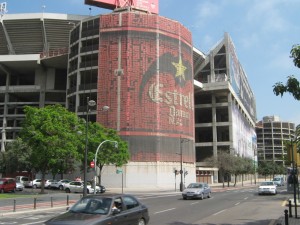
Valencia went on to eliminate Lazio, who would later cause discontent in Valencia by signing their stars Mendieta and Claudio Lopez, and in the semi final they beat eternal rivals Barcelona.
In the final however they showed their inexperience, losing 3-0 with a poor performance.
In the league they finished 3rd and so would be back in the Champions the next year, when they would once again lose the final, although unluckily.
It was a strange season and one in which Valencia was once again humiliated in the cup by a vastly inferior side, Guadix.
They came 5th in the league and consequently for the following year wouldn’t make the Champions League, whose final they lost in Milan against Bayern Munich on penalties.
Once again they had been put in the same second round group as Manchester United, but this time drew both matches.
The semi final also saw them drawn against an English team, Leeds United. After a hard-won draw at Elland Road, Valencia turned in a memorable performance in Mestalla, eliminating Leeds with an overwhelming 3-0 result.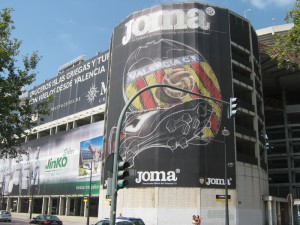
The following season, 2001-2002, Valencia took a gamble by hiring a largely unknown coach with no First Division experience, Rafa Benitez. It was a gamble that paid off.
In his first season Benitez, with his ‘step by step’ policy, built a confident team in which there were no real stars, only good team players. They won the league with an impressive 7 point lead over the next team.
In the cup there was another disaster as they were disqualified for fielding too many foreign players and in the UEFA cup, Valencia eliminated Celtic in the third round on penalties, but lost in the quarter final to Inter Milan, now coached by Hector Cuper.
The next year was one of disappointment. In the cup they were eliminated yet again by an inferior side on penalties, and in the league only finished 5th. They lost the Super Cup too, and in the Champions League faced Liverpool in their first round group, beating them in both games and perhaps revealing to the Reds what a good coach Benitez was.
In the second round Arsenal was in Valencia’s group, and after drawing at Highbury, Valencia needed a victory against the Gunners to go through. This they achieved but were once again defeated by Cuper’s Inter in the following round.
2003-2004 was arguably Valencia’s best ever year, and one in which they won both the league and the UEFA cup.
It was however the end of an epoch; Benitez was unhappy with the club’s signing policy and received a good offer from Liverpool. Claudio Ranieri returned to the club, which continued to be plagued by internal conflicts between the major shareholders.
Rainieri would not last very long and the club continued in turmoil until it was taken over by local builder Juan Soler and ex-player Quique Sanchez Flores became the coach. In his first year he qualified Valencia for the Champions League again by finishing 4th, but never quite won the confidence of the club or supporters and at the end of 2007 was replaced by Dutch manager and ex-Barcelona player Ronald Koeman.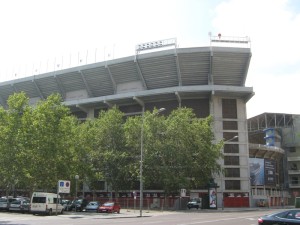
Valencia won the Spanish cup in April 2008, beating Getafe 3-1.
The next coach was the current Arsenal and ex- PSG Paris manager Unai Emery.
Financial crises meant that the club sold all its best players such as David Villa, David Silva, Juan Mata or Jordi Alba.
The current Barcelona manager Valverde spent some time at the club and then so did Juan Antonio Pizza who took Valencia as far as the semi-final of the UEFA Europa League.
In May 2014 the club was bought by Singapore businessman Peter Sim and a number of disasterous decisions were made, including the signing of inexperienced British coach Gary Neville.
Some stability returned with the signing of Marcelino as manager, who guided the team to the Champions League for the 2018/9 season. Their presence there did not last however, and they were soon in the Euro League, where they eliminated Celtic of Glasgow.
In May 2019 the club disputed the Spanish Cup Final with Barcelona FC. and won 2-1. They also qualified again for the Champions’ League.
To be continued……..

